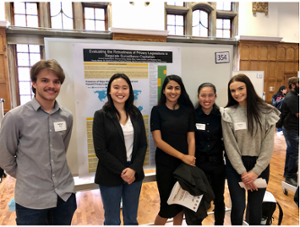New Research Labs in Political Science

The Political Science Department at Purdue University is home to new research labs and programs that support multi-field research collaboration among faculty, post-docs, graduate, and undergraduate students. These labs bring connectivity across disciplines and colleges to address complex questions about technology, governance, institutions of democracy, law, conflict, political attitudes, and political behavior. They advance new tools for research such as audio and video analytics, computational methods, latent-variable measurement, experimental methods, and causal inference.
The new labs build research capacity and create scaffolded opportunities for graduate and undergraduate students to hone their research skills and build project leadership experience. Such opportunities are especially important for scholars who are from traditionally under-represented backgrounds in academia. Purdue Political Science graduate student Owura Kuffuor and colleagues recently published an article in PS: Political Science and Politics “Undergraduates and Political Science Research: Insights from Research Assistants in a Minority-Serving Institution Lab” reporting their findings that lab participation transforms views about research, and develops students’ professional skills and preparation for more advanced studies. The department has recently added an undergraduate Research Collaboratory to provide students with credit for working with faculty on research projects or participating in one of the new labs.
- Computational Social Science Lab – Directed by Dr. Bryce Dietrich. This lab employs computational, empirical and experimental methods in an effort to understand mass and elite behavior, with a particular focus on data from non-traditional sources, like audio and video data. The interdisciplinary team comes from Political Science, Computer Science, Communication, Psychology, Sociology, and Statistics. Current projects include work utilizing the C-SPAN archives, political advertisements, social media and pedestrian interactions caught on publicly available traffic camera feeds.
- Governance and Responsible AI Lab (GRAIL) is Directed by Dr. Kaylyn Jackson Schiff and Dr. Daniel Schiff. GRAIL supports research on the social, ethical, and governance implications of artificial intelligence. GRAIL brings together faculty and graduate and undergraduate students interested in collaborative research, sharing ideas across disciplines, and producing rigorous and impactful, policy-relevant work on the topic of AI.
- The International Politics and Responsible Tech (iPART) Lab is directed by Dr. Swati Srivastava, This lab develops original research on the global politics of Big Tech as firms engage in unprecedented "algorithmic governance.” Projects include building and analyzing original data on sociopolitical harms of Big Tech, tracking and evaluating the global regulation of big tech, and building a collection of public interest reports and disclosures from select online platforms.
- Joe and Maggie Kearns Experimental Social Science Lab Directed by Dr. Tara Grillos (Political Science) and Dr. Trent Mize (Sociology). This lab is a space for cutting-edge experimental research in the social sciences, jointly founded by the Sociology and Political Science Departments. It houses physical space and equipment for conducting lab experiments, consulting facilities, and workspace for lab groups and affiliates. It serves as a multi-disciplinary convener for sharing research and developing new projects.
- Law and Conflict (LAC) research lab is directed by Dr Liana Eustacia Reyes, JD, PhD. The LAC supports the efforts of affiliated researchers to conduct and disseminate research on the implications of law for armed intra- and interstate conflict, governance, foreign policy, and peace processes. The work is rigorous, impactful, and policy relevant and draws insights from diverse theoretical perspectives and methodological approaches. It involves faculty, graduate and undergraduate students, and practitioners conducting solo or collaborative research within and outside of political science.
- Program on American Institutional Renewal (PAIR) is directed by Dr. Jesse Crosson and Dr. Logan Strother. PAIR seeks to advance the generation communication, and use of new knowledge about the workings of America’s governing Institutions. It brings together scholars, students, and practitioners interested in improving the workings of legislatures, courts, executive agencies, and other institutions. It organizing programming for the broader Purdue community, connects students to opportunities, and houses two research labs.
- The Court of Claims Lab Directed by Dr. Logan Strother. The United States Court of (Federal) Claims is a little-studied but crucially important federal court. Faculty, graduate and undergraduate students are compiling data on every case the Court of Claims has decided in its 170+ year history. Once complete, the Court of Claims Database will be publicly available for all to use.
- Parties, Polarization, and Pluralism Lab is directed by Dr. Jesse Crosson. This lab is engaged in a multi-year data collection effort to analyze wither organized interests, political parties, and American democracies support a pluralist system of pragmatic coalitions formed on an issue-by-issue basis. Researchers in the lab explore primary source data from the U.S. Congress and its members to understand the evolving relationships between legislators, political parties, and interest groups. The lab brings together interests of faculty and students at and beyond Purdue.